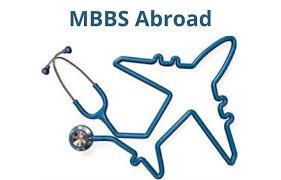MBBS(Bachelor of Medicine, Bachelor of Surgery) is a popular Option for their carrier for Indian students who wish to MBBS Abroad.
Due to limited seats in Indian medical colleges and intense competition, many Indian students consider pursuing MBBS abroad.
Studying medicine abroad offers several advantages, such as exposure to international healthcare systems, a broader perspective on medicine, and potentially lower tuition fees Compared to private Indian medical colleges.

However, it’s essential to research and choose the right university and country for your MBBS education.
Here are some popular Countries for Indian students to pursue MBBS abroad:
1. Russia: Russian medical universities are well-known for their quality education and affordable tuition fees. Many universities offer English-taught programs and have recognition from the Medical Council of India (MCI).
2. Ukraine: Ukrainian universities provide MBBS programs in English and offer competitive tuition fees. Ukraine has a high quality medical education system, with several universities recognized by the MCI.
3. China: China has become a favored destination for Indian students pursuing MBBS abroad. The country offers affordable education and has numerous universities with MCI recognition. However, it’s very crucial to ensure that the university you choose has proper accreditation.
4. Philippines: The Philippines is another popular choice for Indian students due to its English-speaking population and a strong focus on practical training. The MCI recognizes several universities and offer good quality medical education.
5. Central Asian countries: Countries such as Kazakhstan, Kyrgyzstan, and Uzbekistan have gained popularity among Indian students for their affordable tuition fees, English-taught programs, and MCI-recognized universities.
When considering studying MBBS abroad, it’s crucial to check the following factors:
1. Recognition: Ensure that the medical Council of India (MCI) and other relevant medical bodies in India recognize the university you choose.
2. Accreditation: check if the university is accredited by the local medical authorities and recognized internationally.
3. Language of Instruction: Confirm whether the MBBS program is taught in English or the language you are comfortable with.
4. Quality of Education: Research the university’s reputation, faculty qualifications, infrastructure, and clinical exposure.
5. Eligibility Criteria: Understand the entry requirements, including academic qualifications, entrance exams, and Any other prerequisites.
6. Student Support Services: Look for universities that offer support services for international students, including accommodation, visa assistance, and cultural integration programs.
7. Career Opportunities: Consider the prospects for internships, residency programs, and future career opportunities in Both the country of study and India.
It’s important to note that after completing an MBBS degree abroad, graduates need to clear the Foreign Medical Graduates Examination (FMGE) conducted by the MCI to practice medicine in India. The FMGE is a screening test that assesses the medical knowledge and skills of Indian students who studied medicine abroad.
Eligibility for MBBS Abroad
The eligibility criteria for MBBS abroad may vary depending on the country and the university you wish to apply to. However, there are some general eligibility requirements that are commonly observed by many universities offering MBBS programs to international students. Here are the typical eligibility criteria:
1. Academic Qualifications: Applicants must have completed their higher secondary education or equivalent, usually with a science stream (Physics, Chemistry, and Biology) from a recognized educational board. The minimum required percentage or grades may vary between universities.
2. Minimum Age Requirement: Most universities have a minimum age requirement for admission, which is typically 17 years old at the time of application or before a specific date set by the university.
3. English Proficiency: Since the MBBS program is usually teach in English, you may be required to demonstrate proficiency in the English language. This can done by providing scores of standardized English language tests such as IELTS (International English Language Testing System) or TOEFL (Test of English as a Foreign Language). Some universities may have their language proficiency tests.
4. Entrance Exams: Some countries or universities may require you to appear for entrance exams specific to their education system. For example, Russia may require you to take the National Eligibility cum Entrance Test (NEET) conducted by the Medical Council of India (MCI).
5. Passport and Visa: You will need a valid passport to apply for admission and a student visa to study abroad. Make sure you have the necessary documents and meet the requirements set by the respective country’s embassy or consulate.
It’s important to note that the eligibility requirements can vary from one university to another, so it is Recommend to check the specific Requirements of the university you are interested in applying to. Additionally, Keeps in mind that fulfilling the eligibility criteria is just the initial step, and the admission process may involve additional requirements such as interviews or submission of Additional documents.
To ensure accurate and up-to-date information, it is advisable to directly contact the universities or consult with reputable educational consultants who specialize in MBBS admissions abroad. They can guide you through the specific eligibility requirements and assist you in the application process.
Before making any decisions, thoroughly research and consider all aspects, consult with experts, and make an informed choice that aligns with your career goals.